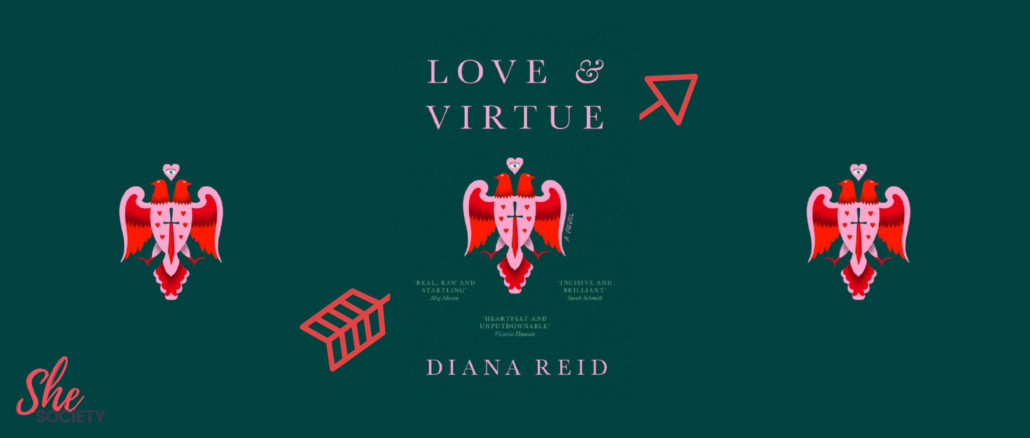
Australian universities, and their accompanying residential colleges, are, in theory at least, fortified and luminous bastions of respectability and accountability. This noble notion, however, is searingly and brutally displaced in Sydney writer Diana Reid’s reflective and disarming debut novel, “Love and Virtue”.
Told in the first person narrative by the novel’s main protagonist, Michaela, a first year arts student on a scholarship, the novel is set predominantly at a Sydney university (never given a specific name) and Fairfax College, an elite residential college on the university grounds, for women, where Michaela and her friends Eve, Claudia, Emily and Portia reside, and the nearby St Thomas’ College, for male students.
In the equally elite St Thomas’ College, reside friends of the girls’; Nick, Sackers and Balthazar (Balth).
In O week of their first year at the University, Eve and Nick, both obstinately drunk, sleep together in Nick’s room at St Thomas’. Eve cannot recall later much of the details of that night, and could not say for a time exactly who it was that she slept with (this later comes to her).
Michaela’s razor-sharply intelligent, outspoken and at-times smugly confidant friend, Eve, is also studying arts and on a scholarship, although for Eve, from a highly privileged, private school educated background, like Claudia, Emily, Portia, Nick, Sackers and Balth, her scholarship is more accepted out of status rather than financial necessity, as it is for Michaela (Michaela attended a Catholic school in Canberra, but has a single mother – her father has long ago died – and money is relatively tight).
The boys from St Thomas’ are, in their eyes, hierarchically superior to others, in terms of being educated at top-tier Sydney schools and being from highly affluent families.
Fairfax and particularly St Thomas’ Colleges seem to be a reverberating continuum of school life. As Balth notes as he first meets Michaela, ” ‘..I went to a Sydney private school, so you’re basically the first person I’ve met who I didn’t already know ‘ “.
The boys are presented as notably and in an entrenched way, shallow, self-serving and entitled. Sadly, Nick realises, and confides in Michaela one night, ” ‘We’re some of the most privileged people, world at our feet….and all we can do is get hammered and tell each other about it ‘”. Nick goes on to say ” ‘ I would say that most of my friends aren’t self-reflective. Like, at all. I don’t think they’re capable of it…..It’s as if nothing – nobody around them – has any …Nothing they do ever has any consequence ‘ “.
Michaela and Eve, appearing to be firm friends, attend a first semester, first year, philosophy subject titled “Morals and Mores”. Lecturer, Professor Paul Rosen, is intellectually a giant, and it doesn’t take long before Michaela is infatuated with Paul, as he insists his students call him. Seeing him one night in a pub, when she is out with other students, Michaela kisses Paul, and thus begins a clandestine romantic liaison, forged despite the potential scandal for them both (a professor dating his first year student), the inevitable firing Paul faces if found out, the irrefutable power imbalance and the large age difference – Michaela is eighteen and Paul is thirty-six.
Despite being intellectually soaring, Michaela is still very much an eighteen year old girl, and when Paul eventually breaks up with her, she is left wounded and heartbroken in the painful aftermath.
Eve, meanwhile, pushes Michaela to report to the college what transpired with Nick in O week, as Eve says that it must have been non-consensual on Michaela’s part as
Michaela was so intoxicated. Eve then expresses to Michaela, ” ‘I know I was encouraging you to talk to the college, but…..I think college is the problem ‘ “. Eve goes on to lament, ” ‘ Think about all the behaviours that seem totally normal to us: getting drunk and high all the time, filming each other debasing ourselves then sending it around the next day. Boys boasting about their sex lives, talking about women like conquests, making jokes about them publicly. It’s not normal Michaela’ “.
Eve later takes what happened with Nick and Michaela, and writes about it in the university student newspaper as if it happened to her, and the aftershocks are life-altering for the students.
Diana Reid eloquently espouses themes of power hierarchies in Australian universities, the toxic masculinity culture in (some) Australian boys’ private schools and by extension (some) Australian universities and university residential colleges, and the overtly destructive drinking culture on and off campus involving (some) university students. The descriptions of university life and experiences, whilst frequently disturbing and sad, are nonetheless accurate for many who attend university.
I found “Love and Virtue” to be in turns effervescent, affecting, reflective and sobering. This is a supremely intelligent novel that exists in the world at a time when a voice such as Diana Reid’s is undoubtedly warranted and needed. This is a must-read novel for all in Australian society, and indeed the world.


Leave a Reply